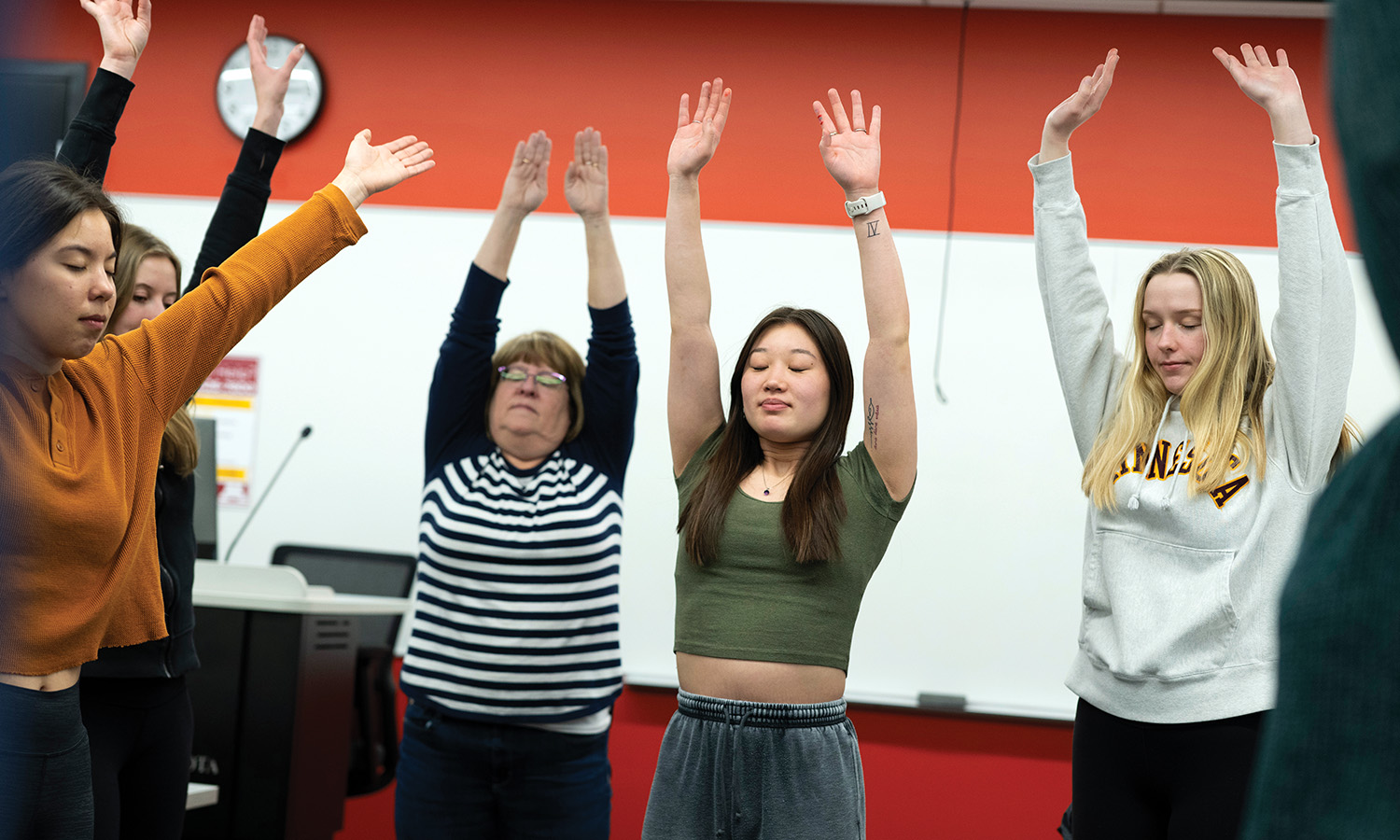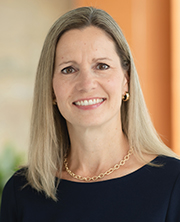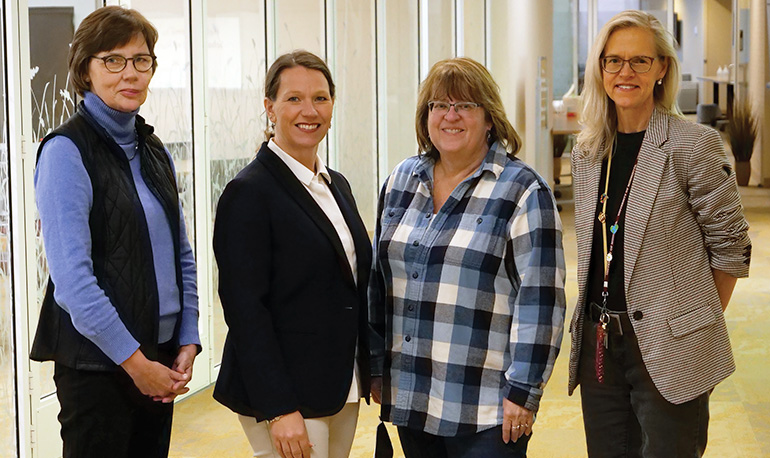Cultivating resilience in nursing students
AACN awards pilot grant to foster leadership, wellbeing
May 3, 2023
Brett Stursa

Above: Clinical Associate Professor Donna Eull leads BSN students in a bird breathing exercise, involving controlled breathing and arm flapping.
As Clinical Associate Professor Donna Eull, PhD, RN, CHPPN, ends a practicum debrief course for seniors in the Bachelor of Science in Nursing (BSN) program, she leads students in a bird breathing exercise that involves controlled breathing and arm flapping.
In another course, she begins the class with a guided meditation. These activities aren’t breaks from learning, they are lessons in resilience, self-care and wellbeing. Those lessons are becoming increasingly more critical in preparing student nurses to succeed as professional nurses.
Eull saw firsthand the importance of these lessons when she onboarded new and early career nurses at Children’s Hospital in Minneapolis. “So many new nurses hadn’t thought about self-care. There was so much focus on the skills and the technical information of being a nurse, but there wasn’t a focus on nurses as human beings and what it takes to do this job over the long trajectory of a career,” says Eull. Without the skills in resilience and self-care, Eull saw that nurses weren’t remaining in the profession.
The data backs up Eull’s observations. Many took notice of a 2014 study that found that 50% of new nurses leave the field within two years. “That study was startling to me but I saw it in the nurses we were onboarding,” says Eull, who says it motivated her to earn a PhD and become nursing faculty. “I wanted to have a hand in how we prepare new nurses to deal with the rigors of a really tough job,” says Eull.
School 1 of 10 awarded AACN pilot grant
Nationally, organizations like the American Association of Colleges of Nursing (AACN) understand the importance of teaching student nurses resilience, self-care and wellbeing. It launched an initiative last year designed to prepare the next generation of nurses with these skills to meet the competency expectations outlined in the new AACN Essentials.
The University of Minnesota School of Nursing was one of 10 schools across the country to be awarded a pilot grant by the AACN for A Competency-Based Approach to Leadership Development and Resilience for Student Nurses, funded by Johnson & Johnson.
“Preparing nurses with the skills needed to foster wellness, self-care, and resilience in themselves and others is imminently important in today’s health care system,” says Deborah Trautman, PhD, RN, FAAN, AACN president and chief executive officer. “AACN is proud to be working with these 10 schools of nursing and their practice partners to advance innovative curriculum and clinical experiences that will prepare nurses entering professional practice with the skills needed to thrive across care settings.”
Initially, the AACN convened an expert advisory board to develop new learning strategies and assessment measures related to personal, professional and leadership development, including activities and self-reflection that foster health, resilience and wellbeing. With research expertise in mindfulness-based interventions that promote resilience and mitigate stress among clinicians and family caregivers, Clinical Professor Sherry Chesak, PhD, RN, is serving on the initiative’s advisory board.

“There is a significant recognition right now that there is need to support clinicians. If anything, COVID shone a light on that,” says Chesak. “As clinicians we witness a lot of suffering and we take on that suffering. If we don’t have a way to work through the impact of that, that’s when burnout and compassion fatigue occur. But there are tools clinicians can use to work through the emotional labor of the job, and it’s so critical, now more than ever, that they learn those practices.”
Pilot builds on student wellbeing already in the curriculum
Clinical Associate Professor Laura Kirk, PhD, RN, and Eull are leading the school’s pilot to integrate resilience, wellbeing and leadership development learning and assessment strategies into the curriculum during the spring 2023 semester. Assistant Dean for Pre-licensure Programs Carol Flaten, DNP, RN, PHN, and Clinical Assistant Professor Erica Timko Olson, PhD, RN, have consulting roles.
Even before the pilot, the School of Nursing emphasized student wellbeing in the BSN curriculum, with students engaged in self-reflection, guided imagery, mindful moments, stretching and breathing exercises. Discussions about how to integrate The Wellbeing Enhances Learning Model, developed by faculty in the Earl E. Bakken Center for Spirituality and Healing, into the BSN curriculum are underway. “This project will help us mobilize the resources we already have and give us some new tools as well,” says Kirk.
The project is being piloted with seniors in the BSN program in their leadership and practicum debrief courses. Faculty are utilizing a variety of wellbeing assessment tools and ideas, including those provided in the AACN toolkit. Wellbeing lessons are incorporated into reflection assignments and weekly goals. Pre and post measures are being collected to assess the impact on student competency. “Once we determine what resources work the best or resonate the most for students, the goal will be to weave this through all of the curriculum, starting as sophomores,” says Kirk.

Meanwhile, faculty from the 10 schools in the pilot are meeting monthly to share successes and lessons learned to build off of each other’s efforts, and AACN will disseminate findings after determining outcomes so that schools across the country can integrate these lessons into the curriculum.
Integrating resilience, wellbeing and leadership development into the curriculum not only serves the student nurses, but also improves patient outcomes. “Patients do better when they feel genuinely cared for. If a nurse is burnt out or fatigued, they are not going to be able to accomplish that,” says Eull. “The feeling of being genuinely cared for, respected, and affirmed improves patient outcomes, and nurses need to have personal resilience to provide that kind of care.”
